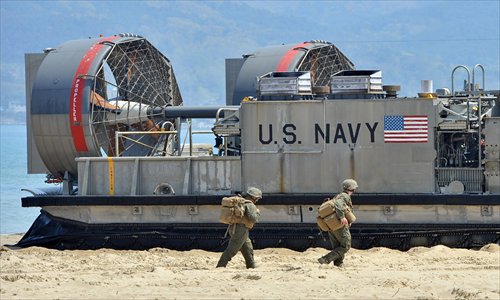China, NK to hold talks on nuclear crisis: media report

Imminent dialogue reportedly planned to take place between China and North Korea, if confirmed, could help defuse soaring tensions in the Korean Peninsula, analysts said, noting that more work needs to be done to persuade Pyongyang to give up its nuclear weapons and rejoin the stalled Six-Party Talks.
Citing a source knowledgeable about North Korean affairs, Japan's Asahi Shimbun newspaper reported Saturday that North Korea indicated in mid-April that it is ready for talks with China regarding the nuclear crisis.
It said China will also likely send a senior official, possibly Wu Dawei, China's special representative for Korean Peninsula affairs and chairman of the Six-party Talks, to Pyongyang for discussions.
"The Chinese side is expected to call on North Korea to agree to either dialogue with the US or resumption of the Six-Party talks," the newspaper said.
Zhang Liangui, a specialist in Korean issues at the Party School of the Central Committee of the CPC, told the Global Times that even if North Korea agrees to first engage with China, there has been no indication so far it will make any concessions on the nuclear issue. And the most likely scenario is that it will again stress preconditions required for the resumption of dialogue with South Korea and the US.
"But denuclearization on the peninsula is what all the other parties concerned want to see and I think they should still try to figure a way out to persuade North Korea to give up its nuclear weapons," Zhang said.
Lü Chao, director of the Korean Research Center at China's Liaoning Academy of Social Sciences, said that North Korea has chosen to use a combination of both hard and soft means to serve its interests, according to changes in the situation.
"In terms of 'hard' policies, it almost emptied its rhetoric by issuing the recent war threats and now that the US has proposed an offer of dialogue, maybe it will make a diplomatic gesture to explore the issue," Lü said. "This is a sign that the tension could be cooled down if all parties seize the opportunity."
North Korea on Thursday demanded the UN sanctions that were imposed after its third nuclear test be dropped, and that the US remove its nuclear "war tools" on the Korean Peninsula before the resumption of any denuclearization talks.
The proposal, though rejected by the US and South Korea, marked a relatively soft tone by North Korea.
But meanwhile, South Korea's defense ministry said Monday an expected missile launch by North Korea may stretch to July after Pyongyang has been keeping the international community on edge for over two weeks due to its expected missile test.
"These are three potential dates, but no one can predict exactly what direction the North will take," South Korean Defense Ministry spokesman Kim Min-seok told reporters, according to AFP.
He identified three possible dates, the April 25 founding anniversary of the Korean People's Army, April 30, the final day of ongoing South-US military exercises and the July 27 anniversary of the armistice that ended the 1950-53 Korean War.
An unidentified South Korean military source told South Korea's Yonhap news agency Sunday that North Korea has moved two more missile launchers for short-range Scud missiles to its northeast province of South Hamgyong.
"The priority of all parties concerned should not be regarding its expected missile test, but on how to press Pyongyang into abandoning its nuclear weapons and joining the Six-Party Talks," Zhang said.
"The tension has already been taken to extremes, so the missile launch won't significantly change the status quo unless North Korea uses it to strikes military targets," he said.
Agencies contributed to this story